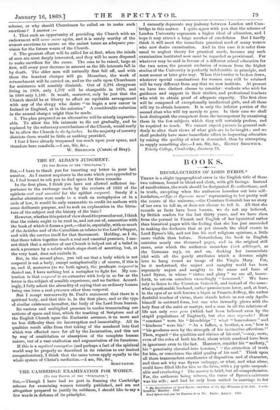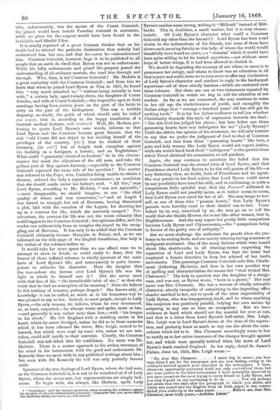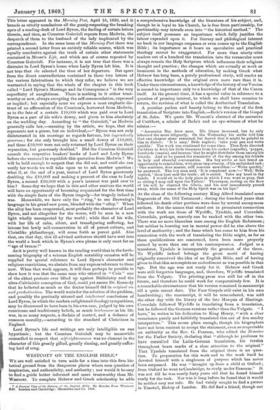BOOKS.
RECOLLECTIONS OF LORD BYRON.*
THERE is a slight typographical error in the English title of these two volumes, bound in blood-red cloth, with gilt facings. Instead of recollections, the work should be designated Re-collections; and in truth, excepting when the authoress launches out into selflaudation,—'Ego at Byron us mans' representing to her pretty well the centre of the universe,—the Countess Guiccioli has no story of her own to tell us, or does not choose to tell it. All that she records as facts have been known, we do not say believed, by British readers for the last thirty years, and we have risen from the perusal in French and English of her hysterical rather than historical pages with the feeling that she has just succeeded in making the darkness that as yet shrouds the chief events in Lord Byron's life, and not less his real religious opinions, a little more visible than before. Nevertheless, the book in English contains nearly one thousand pages, and in the original still more, over which the authoress meanders (sich schlagen, as the Germans say), on and on, decking her immaculate idol with all the gaudy attributes which a devotee might love to hang round an image of the Virgin Mary. For, be it understood, the unjust and naughty world has been supremely unjust and naughty to the name and fame of Lord Byron, in whose "virtue and glory" we are all, henceforth, to esteem ourselves exceedingly "honoured." We have only to listen to the Countess Guiccioli, and instead of the somewhat questionable husband, rather promiscuous lover, and, at least, in the eyes of so well-known a bigot as Francis Jeffrey, the rather doubtful teacher of virtue, there stands before us not only Apollo himself in outward form, but one who inwardly glows with the holy fires of the saint or martyr, and a man in all the relations of life not only sans pear (which had been believed even by the stupid populations of England), but also sans reproche How " constant " were his " friendships " ! what " benevolence " and " kindness " were his ! "As a father, a brother, a son," how is "his goodness seen by the strength of his instinctive affections !" Then, regard "the qualities and virtues of his soul,"—nay, more, even of the soles of both his feet, about which mankind have been in ignorance even to the last. Moreover, consider his "modesty," his "generosity elevated into heroism," "the attraction of truth for him, or conscience the chief quality of his soul." Think upon all these transcendent excellencies of disposition and of character, and then ask why was Byron unhappy, or what, and what alone, could have filled life for him to the brim, with a joy quite unspeakable and everlasting ? The answer is brief, but all-comprehensive. For, the authoress being witness, the curse of Byron's existence was his wife ; and had he only been united in marriage to her who, unfortunately, was the epouse of the Count Guiccioli, the planet would have beheld Paradise restored in miniature, while no place for the serpent would have been found in the inviolable and blissful Eden.
It is cruelly reported of a great German thinker that on his death-bed he uttered the pathetic declaration that nobody had understood him but one, and that he—even he—misunderstood him. Countess Guiccioli, however, begs it to be published to all people that on earth do dwell that Byron was not so unfortunate. While his lofty endowments and grand life-purpose passed the understanding of all ordinary mortals, she read him through and through. Who, then, is the Countess Guiccioli? Mr. Medwin is a great authority with the Countess Guiccioli ; and from him we learn that when he joined Lord Byron at Pisa in 1821, he found him "very much attached to," "without being actually in love with," a certain lady, aged twenty-three, the daughter of Count Gamba, and wife of Count Guiccioli,—the respective ages at their marriage having been sixteen years on the part of the bride to sixty on the part of the bridegroom. This was a terrible disparity, no doubt, the perils of which should only be risked con amore, that is, according to the happy translation of a Scottish medical lecturer, with caution Well, Mr. Medwin professing to quote Lord Byron's own words, informs us that Lord Byron and the Countess became great friends, that the rich "old Count did not object to her availing herself of the privileges of the country, [sic that he winked at their intimacy, [or not?] but at length took exception against his lordship as a foreigner, a heretic, and an Englishman." What could "generosity elevated to heroism" do in the circumstances but resist the objections of the old man, and take the gallant part of May against January,—especially as the Countess Guiccioli espoused the same aide of the question? The matter was referred to the Pope, who, Catholics being unable to obtain a divorce, ordered the lady a separate maintenance, on condition that she should reside under her father's roof. 11 All this," says Lord Byron, according to Mr. hIedwin, "was not agreeable," —most disagreeable, we should imagine, to one "the chief quality of whose soul was conscience,"—" and at length I was forced to smuggle her out of Ravenna, having discovered a plot, laid with the sanction of the Legate, for shutting her up in a convent for life, which she narrowly escaped." Peradventure, the convent for life was not the worst calamity that could happen to the Countess Guiccioli ; but opinions differ, and the reader can without help from us imagine the sequel to the smuggling out of Ravenna. It has only to be added that the Countess Guiccioli ultimately became Marquise de Boissy, and, as we are informed on the title-page of the English translation, this lady is the writer of the volumes before us.
It would take far more space than we can afford were we to attempt to show in detail, as could easily be done, that the framer of these inflated volumes is wholly ignorant of the main facts of Lord Byron's life, and consequently is quite incompetent to estimate his character. Does she imagine that the rose-colour she throws over Lord Byron's life was the light in which he himself saw it ? Did she never meet with that line of his, "the ineradicable taint of sin ;" or does she think that he had no conception of its meaning ? Does she believe he felt nothing of remorse, perhaps despair? She knows only, if knowledge it can be called, so much as in his humorous way he was pleased to say to her. Indeed, to most people, except to Lady Byron,—the only woman, we believe, whom he ever reverenced, or, at least, respected,—he always wrote and spoke, more or less, —and generally it was rather more than less,—with "his tongue in his cheek." Ile left England with a rankling secret in his heart, which be never divulged, unless he did so in those memoirs which it has been affirmed his sister, Mrs. Leigh, caused to be burned, but which were read by some who, unless we are mistaken, could still testify to their contents. Clearly, the Countess Guiccioli was not taken into his confidence. No more was Mr. Medwin. There is a nearer approach to the artless utterance of his mind in his intercourse with the good and enthusiastic Dr. Kennedy than we meet with in any published writings about him ; but even with Dr. Kennedy the veil was only partially thrown aside.
Ignorant of the true feelings of Lord Byron, whom she had seen, as the Countess Guiccioli is, it is not to be wondered at if of Lady Byron, whom she never saw, her representations are simply ludicrous. To begin with, she always, like Medwin, spells Lady Byron's maiden name wrong, writing it "Milbank" instead of Millbanke. This is, doubtless, a small matter, but it is very charac teristic. Of Lidy Byron's character what could a Countess Guiccioli say other than she has said ? Lord Byron has been a sad
victim to the indiscretions of his friends, but none of them have shown such amazing fatuity as this lady, of whom the world would thankfully have heard no more,—a " remains" which it would have
been quite willing to let lie buried anywhere,—not without some hope of better things, if it had been allowed to cherish it.
We should be degrading the memory of one whom to name is to pronounce her eulogy, and whom to know was an education in all that is pure and noble, were we to even seem to offer any vindication of Lady Byron's character and conduct in reply to the hackneyed aspersions—all of them utterly baseless—which are scattered over these volumes. But there are one or two statements repeated by Countess Guiccioli to which we beg to call the attention of our readers. As far as we are concerned, she may continue to nurse in her old age the vindictiveness of youth, and exemplify the Italian adage that "revenge a hundred years' old has still got its sucking teeth." It is for her father-confessor to tell her whether Christianity demands this style of expression towards the dead : "Ere this God has judged her above ; but here below can those possessing hearts have any indulgence for her" (Lady Byron) ?
Until she obtain the opinion of his reverence, we will only venture to say that we prefer the judgment of God to that of Countess Guiccioli, and that from those "possessing hearts" like hers, a pure and holy woman like Lady Byron would not expect justice, while she would hand back their " indulgence " to the quarter from which Tetzel obtained his commission to sell pardons.
Again, she may continue to entertain the belief that the Countess Guiccioli was the eternal twin of Lord Byron, and that
Providence elected Lidy Byron to be the evil genius of his life—a very flattering view, no doubt, both of Providence and its agent. She may persist in her fond notion that Lord Byron could never
by any possibility have loved his wife, and in exclaiming, in quite a tempestuous little spiteful way, that the Farewell addressed to Lady Byron could not possibly mean, as it rather seems to mean, that Lord Byron ever cared for her at all. She may image to herself, as one of those who "possess hearts," that Lady Byron's parents were horribly cruel to their dutiful son-in-law. Unre
baked by us, nay, unnoticed by us, she may go on to tell the world that she thanks Heaven she is not like other women, that is, Englishwomen. And she may repeat her pretty little comparison between Lady Byron and Clytemnestra,—the "comparison being in favour of the guilty one of antiquity !"
But we must challenge the authoress for proofs when she professes to be stating facts, and not merely uttering raving nonsense or malignant sentiment. One of the many fictions which were tossed about like shuttlecocks in all drawingrooms respecting the separation of Lord and Lady Byron, was that the latter had employed a female detective to keep her advised of her lord's movements. This personage Countess Guiccioli calls Mrs. Cherie wont (following Medwin), and then in her own peculiar way of spelling and characterization she names her "that wicked Mrs. Claremont." The lady in question was the daughter of a clergyman, and was not, as Byron wrote, "born in a garret." Her real name was Mrs. Clermont. She was a woman of wholly estimable character, utterly incapable of submitting to the degrading office slander ascribed to her, not to speak of the utter impossibility of Lady Byron, who was transparency itself, and to whom anything like suspicion was positively painful, belying her own nature by assigning to any one so base an occupation. But we have evidence at hand which should set the scandal for ever at rest, and that is a letter from Lord Byron's half-sister, Mrs. Leigh. Mrs. Leigh was in Lord Byron's house at the time of the separa •
tion, and probably knew as much as any one else about the antecedents which led to it. Mrs. Clermont accordingly wrote to her to testify as to her entire innocence of the charges brought against her, and which were specially revived when the news of Lord Byron's death reached England. In her reply, dated St. James's Palace, June 1st, 1824, Mrs. Leigh wrote :— "My dear Mrs. Clermont I must beg to assure you how very sorry I am for the annoyance you are now feeling, owing to the calumnies revived against your charactor in the newspapers. I have, whenever opportunity presented itself, not only contradicted them, but also done justice to the kind forbearance I have invariably observed in you upon occasions the most trying to every friend to Lady Byron, and you may depend on my continuing to do so You are perhaps not aware that two days after the paragraph to which you allude, and which was copied into the English from an Irish paper, it was contra dicted from authority in the same paper Believe me, dear Mrs. Clermont, most truly yours,—Augusta Lamm"
This letter appeared in the Morning Post, April 16, 1830, and it brands as utterly mendacious all the gossip respecting the breaking open of a reading-desk of Lord Byron, the finding of certain letters therein, and then, as Countess Guiccioli repeats from Medwin, the despatch of them to the husband of the lady implicated by the correspondence. In the same issue of the Morning Post there was printed a second letter from an entirely reliable source, which was equally conclusive against the truth of certain other statements contained in Moore's Life, and which are of course repeated by Countess Guiccioli. For instance, it is not true that there was a distraint in Lord Byron's house when Lady Byron left him. It is not true that she selected the time of her departure. But apart from the direct contradictions contained in these two letters of the various fabrications to which they refer, we believe we are warranted in saying that the whole of the chapter in this book called " Lord Byron's Marriage and its Consequences "is the very superfluity of naughtiness. There is nothing in it either trustworthy or new, always excepting the self-commendation, expressed or implied ; but especially must we express a most emphatic distrust of an affirmation of the Countess's, borrowed from Medwin, as to the fate of a certain £10,000 which was paid over to Lord Byron as a part of his wife's dowry, and given to him absolutely on the wedding day. According to "the Guiccioli," as Medwin generally calls her,—meaning by the article, we hope, that she represents not a genus, but an individual,—" Byron was not only disinterested in his marriage as regards fortune, but imprudently generous ; for she only brought him a small dowry of £10,000, and those £10,000 were not only returned by Lord Byron on their separation, but generously doubled." Did the Countess Guiccioli consult the respective bankers' books of Lord and Lady Byron before she ventured to republish this quotation from Med win ? We will be bold enough to suspect that she did not, and until she can verify her words we will take upon us to ask another question : what if, at the end of a year, instead of Lord Byron generously doubling the £10,000 and making a present of the sum to Lady Byron, a second £10,000 with a year's interest was paid over to him ? Some day we hope that in this and other matters the world will have an opportunity of becoming acquainted for the first time with the simple facts of the Byron tragedy—for tragedy indeed it was. Meanwhile, we have only the "ring," to use Browning's language in his grand new poem, blended with the " alloy." When the alloy has been evaporated, most probably the character of Lord Byron, and not altogether for the worse, will be seen in a new light wholly unsuspected by the world ; while that of his wife, with her life of calm, silent, and transfiguring suffering, her intense but lowly self-consecration to all of purest culture, and Christlike philanthropy, will come forth as purest gold. Alas that, ere that day, this ill-advised authoress should have sent into the world a book which in Byron's own phrase is only meet for an "age of bronze !"
As it is pretty well known in the reading world that in the forthcoming biography of a veteran English notability occasion will be supplied for special reference to Lord Byron's character and religious convictions, we abstain from any express reference to these now. When that work appears, it will then perhaps be possible to show how it was that the same man who uttered in " Cain " one of the ablest protests ever lifted up against Bibliolatry and the ultra-Calvinistic conception of God, could yet assure Dr. Kennedy that he believed as much as the doctor himself did in original sin and predestination. The world waits for the solution of the problem, and possibly the poetically uttered and intellectual conclusions of Lord Byron, in which the modern enlightened theology sympathizes, may be discovered to have been in his own case, judged by his own conscience and traditionary beliefs, as much lawlessness as his life was, in so many respects, a disdain of control, and a defiance of common morality,—according to the standard of Christians in England.
Lord Byron's life and writings are only intelligible on one hypothesis ; but the Countess Guiccioli may be meanwhile counselled to suspect that self-righteousness was no element in the character of this greatly gifted, greatly sinning, and greatly suffering lord of song.
































 Previous page
Previous page